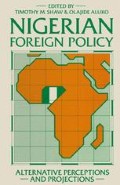Abstract
There are three important interrelated issues presently identifiable in the continuing debate about Nigerian foreign policy. First, as reflected in the official and Aluko citations above, does Nigeria have the ‘power’ to exert a significant influence in contemporary international affairs? Second, as indicated in all three opening quotations, but especially in that of Ogunbadejo, is Nigerian policy effective, at either global, continental or regional levels? And third, given Nigeria’s political economy and development strategy, what should be the orientation or direction of its foreign policy in the mid-term future?
In a world economy that is basically reliant on oil, Nigeria’s economic and strategic importance is enormous … Increasingly, Nigeria’s wealth and position has immensely enhanced her political and strategic importance in Africa and world politics. A strong member of OPEC, a pioneer and stabilising force in the OAU, a member of the British Commonwealth of Nations, a dynamic member of the Non-Aligned Nations, a co-founder of ECOWAS, Nigeria is slowly but assuredly emerging as a major factor in the global power calculus.
Nigerian Development Plan Advertisement [1]
Clearly, the record of the military in the field of the country’s foreign relations is, in varying degrees, much better than that of the Balewa regime. But then, this could be explained to some extent by way of Lagos’ increased capability for influence. Its oil wealth, particularly in the years after the civil war, provided Nigeria with the economic base, and thus the confidence, to give more substance to its foreign policy of nonalignment.
Oye Ogunbadejo [2]
[On] the subject of my inaugural lecture—‘Necessity and Freedom in Nigerian Foreign Policy’—I shall say a few words why I have chosen it … The first is the lack of purpose and consistency in our foreign policy since the mid-seventies. The second has been the tendency of the Nigerian government and some powerful sections of the public to overestimate our ability to influence external events, and perhaps shape world events in our own image. An example of this was the recent statement of the Minister of External Affairs, Professor Ishaya Audu, that Nigeria was ‘longing to become a world super-power soonest’. The third is the psychological trait among Nigerian leaders and some sections of influential opinion-moulders that we have a great deal of freedom of manoeuvre in the conduct of our external relations.
Olajide Aluko [3]
Access this chapter
Tax calculation will be finalised at checkout
Purchases are for personal use only
Preview
Unable to display preview. Download preview PDF.
Notes and References
Oye Ogunbadejo, ‘Nigeria’s Foreign Policy Under Military Rule 1966–79’, International Journal, 35 (4), Autumn 1980, p. 765.
Olajide Aluko, ‘Necessity and Freedom in Nigerian Foreign Policy’, inaugural lecture, University of Ife, 17 March 1981, pp. 9–10.
On these see Timothy M. Shaw, ‘Towards an International Political Economy for the 1980s: from Dependence to (Inter)Dependence’ (Halifax: Centre for Foreign Policy Studies, 1980).
See Timothy M. Shaw and Orobola Fasehun, ‘Nigeria in the World System: Alternative Approaches, Explanations and Projections’, Journal of Modern African Studies, 18 (4), December 1980, pp. 551–73.
For a lament on the state of African foreign policy studies see Timothy M. Shaw, ‘Class, Country and Corporation: Africa in the Capitalist World System’ in Donald I. Ray et al. (eds.), Into the 80s: Proceedings of the 11th Annual Conference of the Canadian Association of African Studies, Vol. 2 (Vancouver: Tantalus, 1981) , pp. 19–37.
On Nigeria’s new dependence, having diversified products and markets between its palm oil and fuel oil periods, see Timothy M. Shaw, ’Dependence with Growth: the Political Economy of Petroleum in Nigeria’, Workshop on the Effects of Commodity Dependence on Development in African Countries (Centre for African Studies, Dalhousie University, March 1981).
On these see Timothy M. Shaw, ‘Nigeria’s Political Economy: Constitutions, Capitalism and Contradictions’, ODI Review, 2, 1980, pp. 76–85.
On Africa’s unpromising prospects and on Nigeria’s promising projections see Timothy M. Shaw (ed.), Alternative Futures for Africa (Boulder: Westview, 1982), especially chapter 7 on ‘The Future of Development in Nigeria and the Sahel: Projections from the World Integrated Model (WIM) , , by Barry Hughes and Patricia Strauch.
On a similar division within Zambia’s political economy, see Timothy M. Shaw, ‘Dilemmas of Dependence and (Under) Development: Conflicts and Choices in Zambia’s Present and Prospective Foreign Policy’, Africa Today, 26 (4), Fourth Quarter 1979, pp. 43–65.
See Yusufu Bala Usman’s open letter, ‘Debate on Libya Warms Up’, West Africa, 3318, 2 March 1981, pp. 421–3.
On the general question of regional dominance in Africa since the mid-1970s see Timothy M. Shaw, ‘Foreign Policy, Political Economy and the Future: Reflections on Africa in the World System’, African Affairs, 79 (315), April 1980, pp. 260–8 and
‘Kenya and South Africa: ‘Sub-imperialist’ States’, Orbis, 21 (2), Summer 1977, pp. 357–94.
Editor information
Editors and Affiliations
Copyright information
© 1983 Timothy M. Shaw and Olajide Aluko
About this chapter
Cite this chapter
Shaw, T.M. (1983). Nigeria in World Politics: Contemporary Calculations and Constraints. In: Shaw, T.M., Aluko, O. (eds) Nigerian Foreign Policy. Palgrave Macmillan, London. https://doi.org/10.1007/978-1-349-06301-7_2
Download citation
DOI: https://doi.org/10.1007/978-1-349-06301-7_2
Publisher Name: Palgrave Macmillan, London
Print ISBN: 978-1-349-06303-1
Online ISBN: 978-1-349-06301-7
eBook Packages: Palgrave Political & Intern. Studies CollectionPolitical Science and International Studies (R0)

